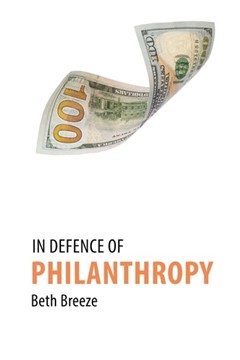The College Donor Digest
From the Bookshelf: What Is Philanthropy For?
November 02, 2023 | Rebecca Richards
In his 2023 book What Is Philanthropy For?, author Rhodri Davies illuminates what philanthropy is by contrasting it with what it is not, namely, charity, justice, the state, democracy, and the market. By comparing philanthropy to each of these, he is also able to trace the historical development of modern dilemmas and, importantly, helps the reader realize that our problems are not new but reiterations of enduring tensions.
Each chapter compares philanthropy with one of the aforementioned concepts, beginning with a historical overview and concluding with a modern application. The chapter on charity covers the word’s etymology, the role religion plays, and the distinction between charity meeting immediate needs and philanthropy taking on systemic problems. Mr. Davies writes, “we should see philanthropy and charity less as a matter of either/or and more as both/and: the ideal being to balance the immediacy and human connection of charity with the rationality and universality of philanthropy.” He touches on how the growth in crowdfunding, as well as the giving practices of MacKenzie Scott and Melinda Gates, such as major, unrestricted gifts, may significantly shape future philanthropy.
Those curious to learn about the history of philanthropy will find Mr. Davies’s book both well-researched and readable. Beyond that, he presents invaluable insights into how conversations about philanthropy reflect broader issues within society.
In our haste to fix what is wrong with the world, we may forget why we started. This might be as simple as neglecting the needs of those closest to us, but it can also lead to dangerous conclusions. Mr. Davies warns that “The ignominious legacy of philanthropy’s entanglement with eugenics . . . acts as a stark reminder of what can happen if we lose sight of basic principles of empathy and human decency in the quest for clear-cut solutions to complex social problems.” We must not overlook decency in our pursuit of justice.
A polarized political and social climate amplifies our inability to wrestle with our history, which in turn cripples our attempts to find solutions to current problems. Mr. Davies notes, “Unfortunately, in this febrile atmosphere the nuance and complexity necessary for genuine understanding of the past tend to be among the first casualties; discussion of historically tainted donations often collapses into easy binaries or simplistic generalizations that don’t get us closer to a proper understanding of how to navigate the challenges.” While it is tempting to glaze over a complicated past, Mr. Davies’s book does an excellent job of highlighting how our history can, and should, inform the decisions we face now.
Due to the wide scope (and short page count) of What Is Philanthropy For?, Mr. Davies’s account is limited. However, it is a remarkably useful guide to the significant number of thinkers, politicians, and donors and historical events that have made philanthropy what it is today. At just 160 pages, it is well worth the reader’s time.
This article originally appeared in Philanthropy Daily on November 1, 2023.







